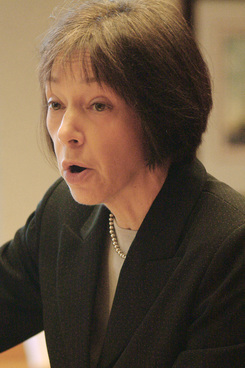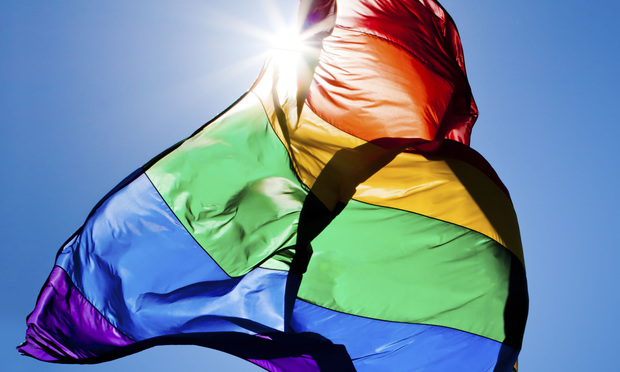In Gay Rights 'Gamechanger,' Appeals Court Bars Employment Bias Based on Sexual Orientation
A federal appeals court on Tuesday ruled that discrimination against employees on the basis of sexual orientation violates the Civil Rights Act, in what was hailed as a landmark decision by gay rights advocates who have fought for years to expand workplace protections.
April 05, 2017 at 09:48 AM
6 minute read
A federal appeals court on Tuesday ruled that discrimination against employees on the basis of sexual orientation violates the Civil Rights Act, in what was hailed as a landmark decision by gay rights advocates who have fought for years to expand workplace protections.
The opinion from the U.S. Court of Appeals for the Seventh Circuit, sitting en banc, overturns an earlier ruling by a three-judge panel of the court just a year before. That decision upheld the dismissal of a discrimination lawsuit by an openly lesbian woman who had sued after she was denied faculty positions at the community college where she taught.
Other federal appeals courts have similarly ruled that the Civil Rights Act does not include protections for gay or bisexual employees. Last month, the U.S. Court of Appeals for the Eleventh Circuit issued a decision along those lines, although that case may also be reviewed en banc.
In its divisive 8-3 ruling Tuesday, the Seventh Circuit majority took a different view of how to interpret the term “sex” in Title VII of the Civil Rights Act, which prohibits the denial of employment opportunities on the basis of “race, color, religion, sex, or national origin.”
Related Articles:
Writing for the majority, Chief Judge Diane Wood rejected the contention by defendant Ivy Tech Community College of Indiana that the term should be interpreted narrowly because previous legislative proposals to amend Title VII to add the words “sexual orientation” have not gained traction in Congress.
 Judge Diane Wood. (Photo: Roberto Westbrook)
Judge Diane Wood. (Photo: Roberto Westbrook)“Many of our sister circuits have also noted this fact,” Wood wrote. “In our view, however, it is simply too difficult to draw a reliable inference from these truncated legislative initiatives to rest our opinion on them. The goalposts have been moving over the years, as the Supreme Court has shed more light on the scope of the language that already is in the statute: no sex discrimination.”
Former Ivy Tech adjunct professor Kimberly Hively, represented by the Lambda Legal Defense & Education Fund, advanced twin arguments before the court: first, that all else being equal, she would have been treated differently if she was a man in a relationship with a woman; and that her rights to associate intimately with a person of the same sex are protected under Supreme Court precedents beginning with Loving v. Virginia.
The en banc panel found that both avenues ended up with an interpretation of the language in the Civil Rights Act that bars sexual orientation-based discrimination.
“The logic of the Supreme Court's decisions, as well as the common-sense reality that it is actually impossible to discriminate on the basis of sexual orientation without discriminating on the basis of sex, persuade us that the time has come to overrule our previous cases that have endeavored to find and observe that line,” Wood wrote.
The broader interpretation of the statute drew a sharp-tongued rebuke by three of the circuit's judges. Judge Diane Sykes, who was one of the jurists on President Donald Trump's shortlist for the Supreme Court vacancy, lambasted the “momentous” decision as an example of judges going far outside the bounds of the law to get to a desired result.
This content has been archived. It is available through our partners, LexisNexis® and Bloomberg Law.
To view this content, please continue to their sites.
Not a Lexis Subscriber?
Subscribe Now
Not a Bloomberg Law Subscriber?
Subscribe Now
NOT FOR REPRINT
© 2025 ALM Global, LLC, All Rights Reserved. Request academic re-use from www.copyright.com. All other uses, submit a request to [email protected]. For more information visit Asset & Logo Licensing.
You Might Like
View All
Is 1st Circuit the New Center for Trump Policy Challenges?

Insurance Policies Don’t Cover Home Depot's Data Breach Costs, 6th Circuit Says

'Religious Discrimination'?: 4th Circuit Revives Challenge to Employer Vaccine Mandate
2 minute read
Standing Spat: Split 2nd Circuit Lets Challenge to Pfizer Diversity Program Proceed
Trending Stories
Who Got The Work
J. Brugh Lower of Gibbons has entered an appearance for industrial equipment supplier Devco Corporation in a pending trademark infringement lawsuit. The suit, accusing the defendant of selling knock-off Graco products, was filed Dec. 18 in New Jersey District Court by Rivkin Radler on behalf of Graco Inc. and Graco Minnesota. The case, assigned to U.S. District Judge Zahid N. Quraishi, is 3:24-cv-11294, Graco Inc. et al v. Devco Corporation.
Who Got The Work
Rebecca Maller-Stein and Kent A. Yalowitz of Arnold & Porter Kaye Scholer have entered their appearances for Hanaco Venture Capital and its executives, Lior Prosor and David Frankel, in a pending securities lawsuit. The action, filed on Dec. 24 in New York Southern District Court by Zell, Aron & Co. on behalf of Goldeneye Advisors, accuses the defendants of negligently and fraudulently managing the plaintiff's $1 million investment. The case, assigned to U.S. District Judge Vernon S. Broderick, is 1:24-cv-09918, Goldeneye Advisors, LLC v. Hanaco Venture Capital, Ltd. et al.
Who Got The Work
Attorneys from A&O Shearman has stepped in as defense counsel for Toronto-Dominion Bank and other defendants in a pending securities class action. The suit, filed Dec. 11 in New York Southern District Court by Bleichmar Fonti & Auld, accuses the defendants of concealing the bank's 'pervasive' deficiencies in regards to its compliance with the Bank Secrecy Act and the quality of its anti-money laundering controls. The case, assigned to U.S. District Judge Arun Subramanian, is 1:24-cv-09445, Gonzalez v. The Toronto-Dominion Bank et al.
Who Got The Work
Crown Castle International, a Pennsylvania company providing shared communications infrastructure, has turned to Luke D. Wolf of Gordon Rees Scully Mansukhani to fend off a pending breach-of-contract lawsuit. The court action, filed Nov. 25 in Michigan Eastern District Court by Hooper Hathaway PC on behalf of The Town Residences LLC, accuses Crown Castle of failing to transfer approximately $30,000 in utility payments from T-Mobile in breach of a roof-top lease and assignment agreement. The case, assigned to U.S. District Judge Susan K. Declercq, is 2:24-cv-13131, The Town Residences LLC v. T-Mobile US, Inc. et al.
Who Got The Work
Wilfred P. Coronato and Daniel M. Schwartz of McCarter & English have stepped in as defense counsel to Electrolux Home Products Inc. in a pending product liability lawsuit. The court action, filed Nov. 26 in New York Eastern District Court by Poulos Lopiccolo PC and Nagel Rice LLP on behalf of David Stern, alleges that the defendant's refrigerators’ drawers and shelving repeatedly break and fall apart within months after purchase. The case, assigned to U.S. District Judge Joan M. Azrack, is 2:24-cv-08204, Stern v. Electrolux Home Products, Inc.
Featured Firms
Law Offices of Gary Martin Hays & Associates, P.C.
(470) 294-1674
Law Offices of Mark E. Salomone
(857) 444-6468
Smith & Hassler
(713) 739-1250











